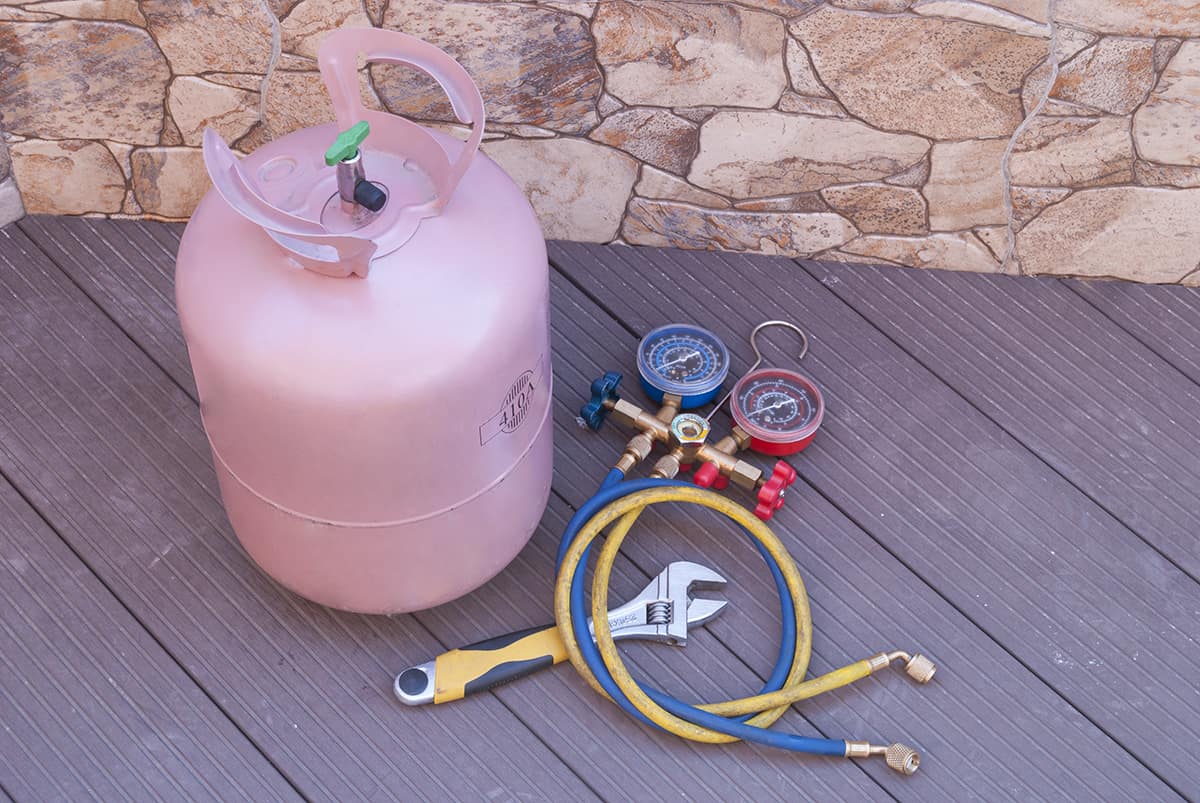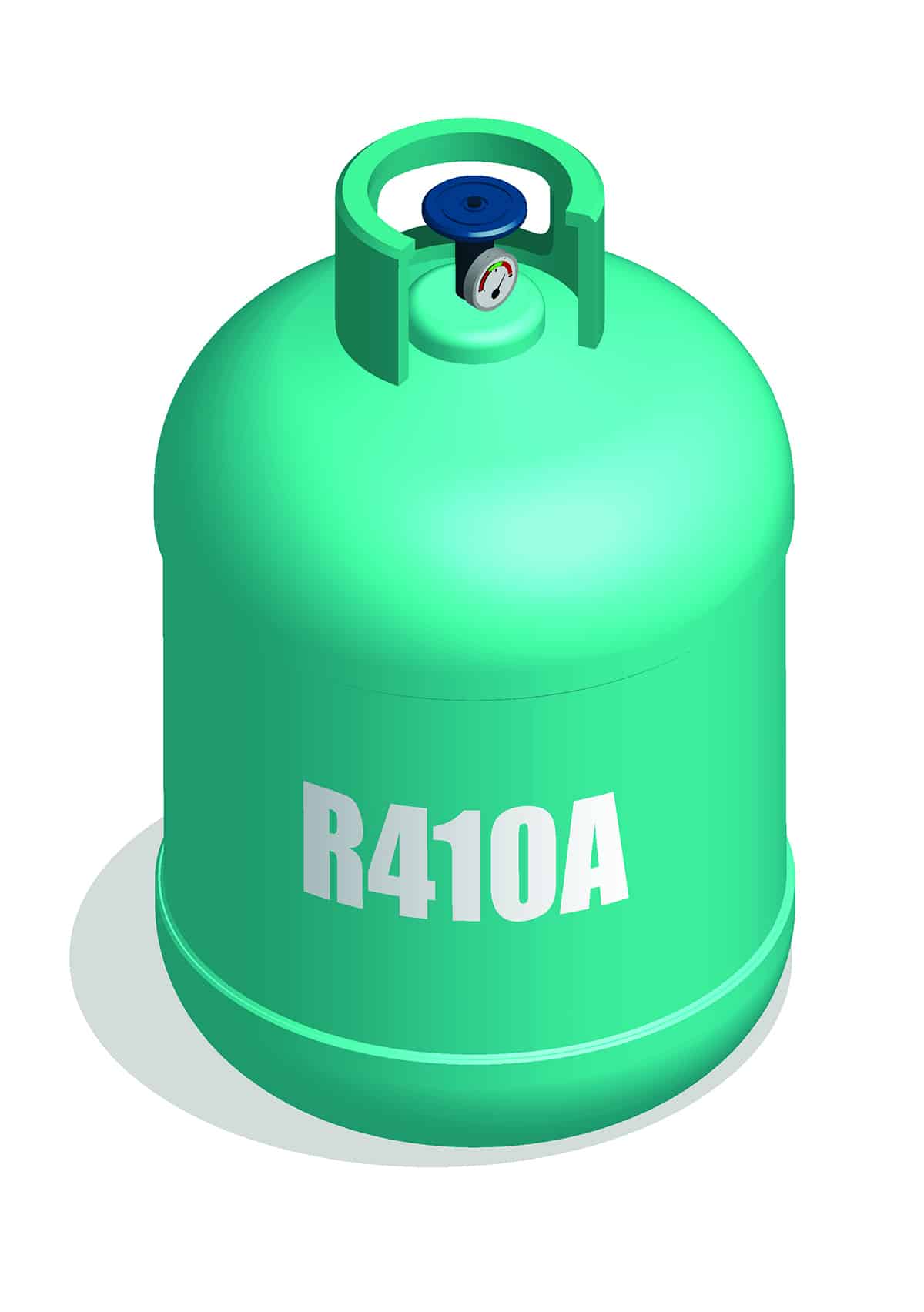R-410A, on average, costs $125 for a 25-pound cylinder. This would be equal to $5 per pound. But this is the cost for license holders who are 608 certified. If you are not an HVAC specialist, you’ll be more likely to purchase R-410A via an HVAC engineer at a higher cost.
Keep reading to learn the detailed cost of R-410 Freon cost per pound.
What is R-410A Freon?
R-410A is a type of freon which is used as a refrigerant. It is widely used and continues to grow in popularity since it became the preferred type of refrigerant, replacing R-22, which was phased out due to the negative impacts on the environment.
What is R-410A Freon Used For?
If you have an air conditioning unit or heat pump in your home, which was purchased after 20120, then it is likely you use R-410A freon. This is used as a refrigerant in cool air systems and is the most commonly used type across the United States, Europe, and Japan. Prior to 2010, you would most likely have had refrigerant systems that used R-22.
This was an incredibly popular type of refrigerant used both residentially and commercially because it was the first of its kind that was not flammable, and therefore it offered a much safer option to alternatives that had been previously available.
However, R-22 was later found to be creating chlorine which was causing damage to the ozone layer, and as a result, it was phased out. R-410A was invented in the 1990s by Honeywell, and it has risen in popularity since it does not produce chlorine.
R-22 was phased out, and as of 2010, all air conditioning units sold in the United States have to be made using R-410A instead of R-22.
Old units which were compatible with R-22 do still exist, but the production and importation of R-22 has been banned in the US since 2020, so if your old unit runs out of R-22, then you will have to dispose of it and buy a new unit since you won’t be able to get hold of R-22 anymore.
The phasing out of R-22 across the world varies by country, but it is widely agreed that R-410A should be used instead of R-22.
Can R-410A Freon Be Used in Old AC Units?
If you have an old air conditioning unit that was purchased prior to 2010, then it may be the type that uses R-22. You will be able to tell which type of freon is used since a sticker should be located on the outside of the unit, which gives you this information.
If your unit needs more R-22 freon, then it’s very unlikely you will be able to source any since it is now illegal to produce or import this type of refrigerant.
The only places which may still have R-22 to sell are those who were stockpiling it prior to the banning.
You may be wondering if you can instead use R-410A in your old unit, and the answer to this is a resounding ‘no.’ R-410A operates at a much higher pressure than R-22, typically between 40 and 70% higher.
This means that the mechanics inside the air conditioning units and heat pumps are different, and you cannot use the different types of freon interchangeably.
R-22 also needs to be run with mineral oil as a lubricant, while R-410A uses POE oil, which again adds to the fact that these two types of refrigerants cannot be used interchangeably. You will need to use the type of refrigerant that your unit was designed to operate with.
How Does R-410-A Freon Work?
R-410A repeatedly goes through the process of evaporating, which is what results in cool air being pushed through your unit. The R-410A gets compressed, which causes it to heat up, and as it does so, it flows through coils that convert the gas to liquid.
This liquid then passes through expansion valves which cool down the liquid until it evaporates, resulting in a cool gas that is used to lower the temperature of air passing through it.
How Much Does R-410A Freon Cost?
The cost of R-410A has risen quite dramatically since its invention around 30 years ago. This is a case of supply and demand since air conditioning units and heat pumps are being sold at a rate that R-410A manufacturers are barely able to keep up with.
There is also a global shortage of some of the necessary components used to make R-410A, which of course, has a knock-on effect on the production line. On average, R-410A costs $125 for a 25-pound cylinder. This means that the R-410A works out at $5 per pound.
However, this is the cost of R-410A when it is supplied to license holders who are 608 certified. If you are not an HVAC specialist, then you are unlikely to be able to buy R-410A yourself and instead will have to purchase it via an HVAC engineer who will charge you a higher rate and an additional cost to load up your unit with the freon.
R-410A is only available in cylinders that have a capacity of 25 pounds or more, but most people will not need an amount this high. Generally, you will use between 2 and 4 pounds of R-410A for every ton of your unit.
So, for example, if your unit is 4 tons, then you will need between 8 and 16 pounds of R-410A to fill it. This is not a DIY job and should not be attempted by someone who doesn’t have HVAC experience, so you’ll want to employ the services of a licensed engineer to supply your R-410A and put it into your unit.
You will likely pay between $10 and $20 per pound of R-410A that you use since your engineer will want to make a profit on the $5 per pound freon they have bought. You will also have to factor in the hourly rates of the engineer, which will vary by region and expertise.
Do I Need More R-410A Freon?
If your air conditioning unit or heat pump is not effectively cooling your home, then you may suspect that it needs an R-410A freon top-up. This may well be the case, but there are other reasons why your unit might not be working that you can investigate yourself before you call out an HVAC engineer.
If your unit doesn’t seem to be cooling properly, then the first thing you should do is check the air filter. If this is dirty, it can stop the unit from cooling as effectively as it once did.
Cleaning or changing the air filter is a relatively easy job that most people can do at home without any relevant experience, so if you want to save yourself some money on calling out a specialist, you should make sure your air filter is clean first.
Next up, make sure the outside of your unit is clean and free from debris. This is another reason why some units stop working efficiently, and it is an easy fix that won’t require any outside help.
Other common reasons which cause an air conditioning unit or heat pump to stop working effectively are because the condenser fan motor is broken or the compressor is not running properly.
If this is the case, you will need an HVAC technician to take a look at your unit and diagnose the issue. They will then be able to tell you if the problem can be fixed or if you would be better off buying a new unit.
In the event that your unit does need an R-410A top-up, your HVAC specialist will be able to identify if this is due to a freon leak. If you have a leak, this will need to be resolved so that you don’t pay for your unit to be filled up, only for it to need doing again in the near future.
There are several ways that you may be able to identify a leak yourself, including listening to the unit to see if you can hear a bubbling or hissing noise or checking the outside of the unit for a build-up of ice near the refrigerant line.
Where Can I Buy R-410A Freon?
Unless you are an HVAC specialist with a 608 license, then you cannot buy R-410A freon yourself or handle it. This is the case in most states, but it is worth checking with your local authority to see if this is definitely the case in your area.
If you are found to be illegally purchasing or handling R-410A freon, then you could find yourself with a fine of up to $5000.
Even if it is not a law in your state that you need to be certified to buy and handle R-410A, you should think carefully about whether this is something you want to do yourself. This can be a dangerous substance to handle, and it is highly toxic, so making an error could be a huge problem.
Most people agree that it is worth paying an experienced HVAC engineer to handle this substance, especially when it is going to be in your home and around your family. Saving a few dollars on a DIY project with R-410A isn’t worth sacrificing your health or peace of mind.







